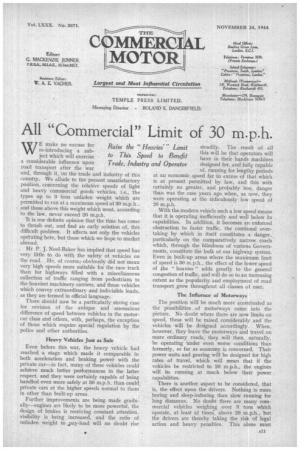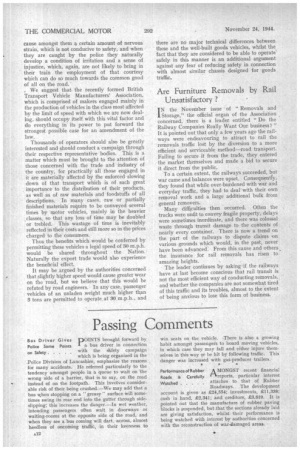All "Commercial" Limit of 30 m.p.h.
Page 13

Page 14

If you've noticed an error in this article please click here to report it so we can fix it.
WE make no excuse for re-introducing a sub ject which will exercise a considerable influence upon road transport after the war and, through it, On the trade and industry of this country. We allude to the present unsatisfactory position. concerning the relative speeds of light and heavy commercial goods vehicles, i.e., the types up to 3 tons unladen weight which are permitted to run at a maximum speed of 30 m.p.h., and those above this weight which must, according to the law, never exceed 20 m.p.h.
it is our definite opinion that the time has come to thrash out, and find an early solution of, this difficult problem. It affects not only the vehicles operating here, but those which we hope to market abroad.
. Mr. P. J. Noel-Baker has implied that speed has very little to do with the safety of vehicles on the road. He, of courser obviously did not mean very high speeds more suitable for the race track than for highways filled with a miscellaneous collection of traffic ranging from pedestrians to the heaviest machinery carriers, and those vehicles which convey extraordinary and indivisible loads, as they are termed in official language.
There should now be a particularly strong case for revision of the antique and anomalous difference of speed between vehicles in the motorcar class and others, with, perhaps, the exception of those which require special regulation by the police and other authorities.
Heavy Vehicles Just as Safe Even before this war, the heavy vehicle had reached a stage which made it comparable in both acceleration and braking power with the private car—in fact, many of these vehicles could achieve much better performances in the latter respect, and they were certainly capable of being handled even more safely at 30 m.p.h. than could. private cars at the higher speeds normal to them in other than built-up areas.
Further improvements are being made gradually—engines are likely to be more powerful, the design of brakes is receiving constant attention, visibility is being increased, and the ratio of unladen weight to ,pay-load will no doubt rise steadily. The result of all this will be that operators will have in their hands machines designed for, and fully capable of, running for lengthy periods at an economic speed far in excess of that which is at present permitted by law, and this with certainly no greater, and probably less, danger than was the case years ago when, as now, they were operating at the ridiculously low speed of 20 m.p.h. With the modern vehicle such a low speed means that it is operating inefficiently and well below its capabilities. In addition, it becomes an enforced obstruction to faster traffic, the continual overtaking by which in itself constitutes a danger, particularly on the comparatively narrow roads which, through the blindness of various Governments, constitute the bulk of our highway system. Even in built-up areas where the maximum limit of speed is 30 m.p.h., the effect of the lower speed of the " heavies " adds greatly to the general congestion of traffic, and will do so to an increasing extent as the popularity and employment of road transport grow throughout all classes of user.
The Influence of Motorways The position will be much more accentuated as the possibilities of motorways come into the picture. No doubt where there are now limits on speed, these will be raised considerably and the vehicles will be designed accordingly. When, however, they leave the motorways and travel on more ordinary roads, they will then, naturally, be operating Wider even worse conditions than formerly, so far as economy is concerned. Their power units and gearing will be designed for high rates of travel, which will mean that if the vehicles be restricted to 20 m.p.h., the engines will be running at much below their power capabilities. There is another aspect to be considered, that is, the effect upon the drivers. Nothing is more boring and sleep-inducing than slow running for long distances. No doubt there are many commercial vehicles weighing over 3 tons which operate, at least at times, above 20 m.p.h., but the drivers are thereby taking the risk of legal action and heavy penalties. This alone must cause amongst them a certain amount of nervous strain, which is not conducive to safety, and when they are caught by the police they naturally develop a condition of irritation and a sense of injustice, which, again, are not likely to bring in their train the employment of that courtesy which can do so much towards the common good of all on the road.
• We suggest that the recently formed British Transport Vehicle Manufacturers' Association, which is comprised of makers engaged mainly in the production of vehicles in the class most affected by the limit of speed with which we are now dealing, should occupy itself with this vital factor and do everything in its power to put forward the strongest possible case for an amendment of the law.
Thousands of operators should also be greatly interested and should conduct a campaign through their respective representative bodies. This is a matter which must be brought to the attention of those concerned with the trade and industry of the country, for practically all those engaged in it are materially affected by the enforced slowing down of that transport which is of such great importance to the distribution of their products, as well as of raw materials and foodstuffs of all descriptions. In many cases, raw or partially finished materials require to be conveyed several times by motor vehicles, mainly in the heavier , classes, so that any loss of time may be doubled or trebled. This wastage of time is inevitably reflected in their costs and still more so in the prices charged to the consumers.
Thus the benefits which would be conferred by permitting these vehicles a legal speed of 30 m.p.h. would be shared throughout the Nation.. Naturally the export trade would also experience the beneficial effect.
It may be argued by the authorities concerned that slightly higher speed would cause greater wear on the road, but we believe that this would be refuted by road engineers. In any case, passenger vehicles of an unladen weight much higher than 3 tons are permitted to operate at 30 m.p.h., and there are no major technical differences between these and the well-built goods vehicles, whilst the fact that they are considered to be able to operate' safely in this manner is an additional argument against any fear of reducing safety in connection with almost similar chassis designed for goods traffic.
Are Furniture Removals by Rail Unsatisfactory ?
IN the November issue of "Removals and Storage," the official organ of the Association concerned, there is a leader entitled "Do the Railway Companies Really Want Our business? " It is pointed out that only a few years ago the railways were endeavouring to attract to rail the removals traffic lost by the diversion to a more efficient and serviceable method—road transport. Failing to secure it from the trade, they entered the market themselves and made a bid to secure it direct from the public.
To a certain extent, the railways succeeded, but war came and balances were upset. Cnnsequentty, they found that while over-burdened with war and everyday traffic, they had to dealwith their own removal work and a large additional bulk from general removers.
Many difficulties then occurred. Often the trucks were unfit to convey fragile property, delays were sometimes inordinate, and there was colossal waste through transit damage to the contents of nearly every container. There is now a trend on the part of the railways to dispute claims .on various grounds which would, in the past, never have been advanced. From this cause and others the insurance for rail removals has risen to amazing heights.
The leader continues by asking if the railways have at last become conscious that rail transit is not the most efficient way of conducting removals, and whether the companies are not somewhat tired of this traffic and its troubles, almost to the extent of being anxious to lose this form of business.




















































